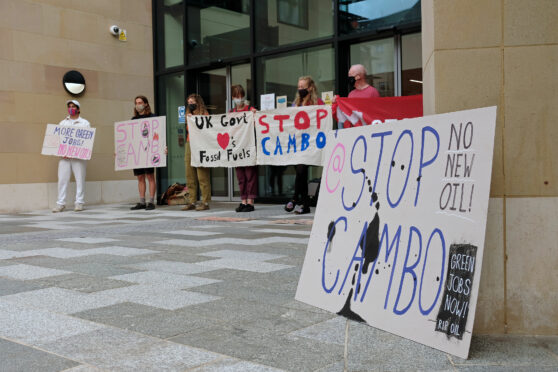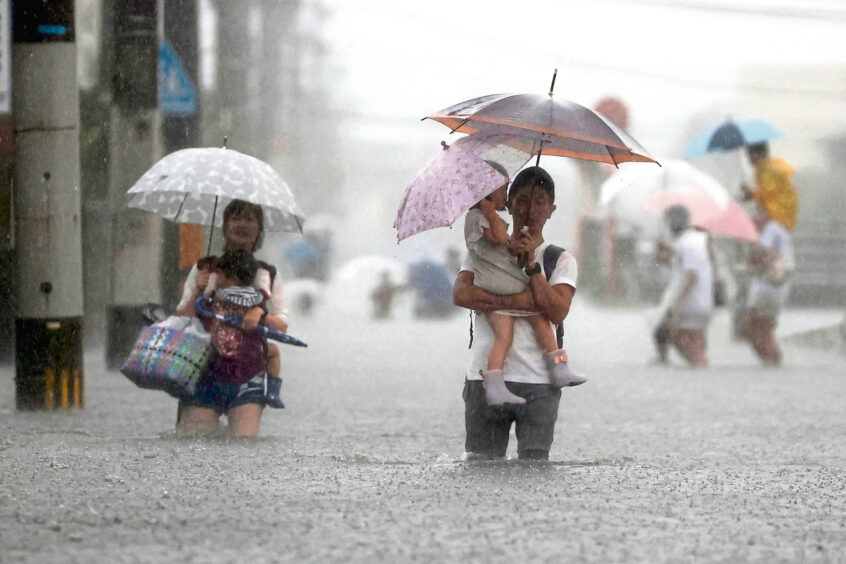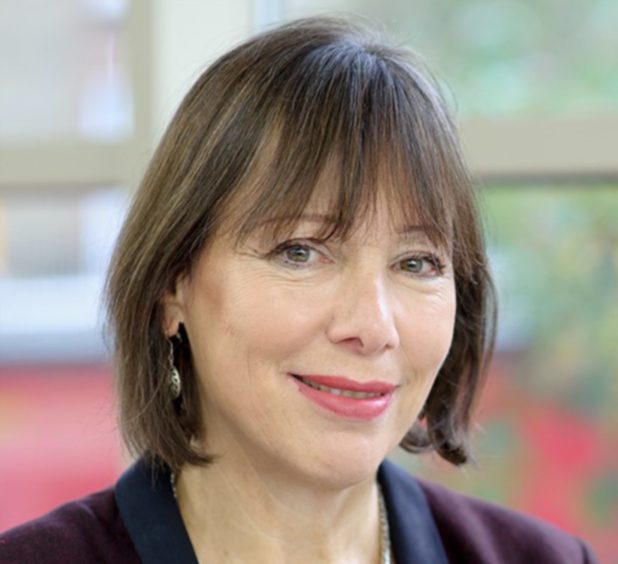
Scientists behind the United Nations’ watershed report on climate change have questioned plans for a huge and contentious oil field off Shetland.
Three members of the international team of scientists behind the Intergovernmental Panel on Climate Change (IPCC) report – described as the most important analysis yet of the impact of climate change and a “code red for humanity” – spoke out as the proposed Cambo field provokes mounting concern.
Drilling could now start there next year if approved by the UK Oil and Gas Authority but the UN scientists warned approval of new fields will make it impossible to secure promised reductions in greenhouse gas emissions.
The First Minister wrote to Boris Johnson last week asking him to reassess the Cambo application but has been accused of hiding behind the Prime Minister by refusing to say if the Scottish Government opposes it or not.
Scientists: green-lighting before Cop26 a terrible look
A decision on the Shetland field could be taken before the Cop26 conference in Glasgow in November, when leaders of 196 countries hope to agree action to limit climate change.
The report by the IPCC, the United Nations group on the impact of global warming, was published on Monday and warned the world must cut greenhouse gas emissions to avoid catastrophic environmental consequences.
One of the authors of the UN report, professor Peter Thorne, said: “Symbolically it is a pretty shambolic state of affairs for the UK to be hosting a major climate conference while, just days before, approving new fossil fuel exploitation.”
Thorne, professor in physical geography at Maynooth University in Ireland, added: “It hardly helps to engender the attitude in other attendees that will be required for a successful agreement to be concluded.”
The IPCC report was published on Monday when United Nations secretary general Antonio Guterres described it as a “code red for humanity” and said it must sound the death knell for fossil fuels.
Another scientist who worked on the report, Andy Turner, associate professor in monsoon systems at Reading University, said: “The IPCC report has highlighted as indisputable that human-induced greenhouse gas emissions have caused the rapid warming seen in recent decades.
“The human signature of this warming and other changes to the climate system is now detectable at all regions on Earth. Global warming, and associated increases in the occurrence and severity of extreme weather such as heavy rainfall, floods, droughts and heatwaves – all seen in the news in recent weeks – will continue to worsen as greenhouse gas emissions increase.
“The ambition of the Paris Agreement, to limit global warming to only 1.5 degrees C above levels seen in pre-industrial times, will become extremely difficult to achieve unless widespread and rapid reductions are made in our emissions of greenhouse gases. Furthermore, for every additional degree of warming, extreme events and the death and destruction they cause are only going to get worse.
“All governments need to act urgently to cut emissions, which would appear inconsistent with the licensing of new oil fields.”
The licence to develop the Cambo field was awarded in 2001, but the UK Oil and Gas Authority has still to give it final approval to go into production. If given the green light, Cambo could yield more than 255 million barrels of oil over its lifetime – but also produce more than 132 million tonnes of CO2 emissions.
Another co-author of the IPCC report, Dan Lunt, professor of climate science at the University of Bristol’s Cabot Institute for the Environment, said: “The IPCC report makes it very clear that if we want to meet the targets laid out by governments in the Paris Agreement, which nearly every country in the world signed up to, including of course the UK, and specifically if we want to meet the target of limiting warming to 1.5 degrees, thereby avoiding the worst impacts of climate change, then we will need immediate and far-reaching cuts in greenhouse gas emissions, such that globally we achieve net zero by 2050.
“In my personal view, it is very hard, if not impossible, to reconcile a policy to expand oil fields with ambitions to reach net zero by 2050.”
He added: “Any decision to expand oil/gas exploration or oil/gas drilling is going to make those targets harder to meet. And actions are what is needed to meet targets, not just words.”
Opposition
Boris Johnson has been urged to block the project but on a recent visit he said the UK Government “can’t just tear up contracts”, adding: “This was a contract that was agreed in 2001 and we can’t just tear up contracts. There’s a process to be gone through.”
In a letter to the Prime Minister on Thursday, Nicola Sturgeon called on him to “reassess” the plans and also asked for a four-nation summit on the climate crisis. She wrote: “I am also asking that the UK Government agrees to reassess licences already issued, but where field development has not yet commenced. That would include the proposed Cambo development.”
Her position has led to accusations from environmentalists and opposition politicians that she has failed to show clear opposition to the project. Labour opposes the drilling and yesterday Scottish Labour leader Anas Sarwar said: “We are facing a climate catastrophe and yet Nicola Sturgeon is still hiding behind Boris Johnson and refusing to take a stand.
“No amount of spin from the First Minister can hide the fact she has been missing in action. The Scottish Green Party has been shamefully quiet on this matter. Now more than ever Scotland needs leadership on the climate crisis.”
The IPCC report, which runs to 3,949 pages, calls climate change “unequivocal” and “an established fact”. Driving the change is the activity of humans, particularly the burning of fossil fuels, the report said. Written by more than 200 scientists, it warns global warming is already accelerating sea-level rise and worsening extremes such as heatwaves, droughts, floods and storms.
Climate warnings
The 2015 Paris Agreement, signed by more than 170 countries, aims to limit global warming to no more than 1.5 degrees Celsius.
The report looked at five potential scenarios and concluded that all will see the world cross the 1.5-degree threshold in the next decade. It said ice melt and sea-level rises are already accelerating and wild weather events, from storms to heatwaves, are expected to worsen and become more frequent.
Further warming is “locked in” due to the greenhouse gases already released into the atmosphere, which means, even if emissions are drastically cut, some changes will be irreversible for centuries.
The UK’s offshore oil and gas industry body said it backed the report but added that oil and gas should continue “to 2050 and beyond”. Deirdre Michie, chief executive of Oil & Gas UK, said firms are increasingly pioneering greener energy and that it was vital to harness the sector’s 50 years of energy expertise to hit the government’s net-zero targets.
The Scottish Government said: “We are wholly committed to ending Scotland’s contribution to climate change by 2045, and to ensuring we do it in a way that is just and leaves no one behind. That is why the First Minister has called for a four-nations summit to be convened in order to discuss how we can work together, both in the run-up to Cop26 and beyond, to ensure that we provide clear leadership to ensure a just transition to net zero that does not repeat the mistakes of the past.
“The IPCC’s most recent scientific report only serves to underline how important it is that we take significant, near-term action in response to the climate emergency – for this and future generations.
“That is why the First Minister has called on the UK Government, who have the power to act in this instance, to urgently re-assess all approved oil licences where drilling has not yet commenced against our climate commitments. It would not be appropriate to pre-empt the outcomes of that re-assessment process.”
Floods, mudslides and fires as world is shaken by extremes
Floods in Japan, mudslides in Turkey and devastating wildfires in the US and Russia were reported yesterday in the latest extreme weather events blamed on global warming.
Severe rains in Japan sparked floods and landslides with more than a million residents being advised to leave their homes and seek shelter.
Meanwhile, floods also claimed the lives of dozens of people in Turkey and wildfires continue to rage in the US and Russia. US Government scientists confirmed yesterday that July was the hottest month the world has ever recorded.
The Japanese flooding saw evacuation alerts issued in Hiroshima and northern Kyushu amid unprecedented levels of rain in the area yesterday.
Scientists say the climate crisis is intensifying the risk of heavy rains because a warmer atmosphere holds more water.
Images showed families clutching their children and attempting to wade to safety through knee-high floodwaters. Residents also used a lifeboat to navigate submerged streets in the city of Kurume.
Officials said a 59-year-old woman died and two of her family members were missing after a landslide destroyed two houses in Unzen in Nagasaki. Downpours are forecast for several more days over large parts of the country.
Elsewhere, wildfires were continuing to rage in Siberia, causing widespread smoke pollution. Friday was declared a non-working day in one region with residents urged to stay at home instead.
In California, The US Forest Service said on Friday it was operating in crisis mode, with staff and resources at full deployment as wildfires continue to threaten thousands of homes and towns.
In Turkey, meanwhile, severe flooding and mudslides have claimed the lives of at least 44 people in coastal parts after rain pounded Black Sea areas sweeping away cars and homes.
More than 100 people died after major flooding hit large parts of mainland Europe last month.
OPINION: A disaster made by humans…but not all humans
Professor Anne Karpf, of London Metropolitan University, is author of How Women Can Save the Planet
Climate change has been “unequivocally” caused by humans, the Intergovernmental Panel on Climate Change declared on Monday. But not all humans.
We’ve long known those who live in rich countries in the global north have done most to create global heating, even if they themselves aren’t wealthy.
Now it’s become clear that gender is a significant factor in carbon emissions. Recent Swedish research found that men contribute 16% more greenhouse emissions than women.
Reams of reports by non-governmental organisations and charities have also discovered that women, especially women of colour in poor countries in the global south, are particularly impacted by the climate crisis.
They are 14 times more likely to die in climate-induced disasters. They suffer most from “climate violence” – violence from male partners after extreme weather events.
This isn’t on account of chromosomes but because of gender, those social roles and identities that shape our behaviour. This means that, in a tsunami, it’s the women who end up carrying the children while at the same time trying to save their cooking pots. Or, after a bush fire, men who haven’t been able to protect their property are more likely to hit out at their wives.
But there is a good news story in here. Countries with a higher proportion of women in government are more likely to pass environment treaties. CO2 emissions are lower in countries where women have higher political status.
Before we elevate women as the magic ingredient that turns countries green, or task them with singlehandedly saving the planet, we need to pause a moment. Women don’t have fewer selfish genes: when we acquire wealth and power we emit just as much as men. It’s just that most women don’t have that power or those opportunities.
It’s also lazy to fall back on stereotypes of women as innate Earth Mothers, programmed to protect the planet.
What we can be sure of, because studies have demonstrated it, is that women take the risk of climate breakdown more seriously than men. Perhaps this isn’t surprising, since they are more likely to be harmed by environmental degradation and to have to pick up pieces after.
So this offers us a brilliant opportunity. If women play a prominent, at the very least equal, role in climate negotiations, the chances of avoiding catastrophe are greatly increased. And the Cop26 climate summit in Glasgow in November is the perfect setting.
But the UK’s Cop26 senior negotiating team is dominated by men, just like all the UN’s climate committees.
There’s hope, though – in campaigns like the Feminist Green New Deal from the Women’s Budget Group and Women’s Environment Network, and #SheChangesClimate, demanding a balance of women and men at the top of the Cop26 leadership team.
In the fight to save the planet, gender equality has emerged, not as an optional extra, but, instead, an alternative route to re-imagining how we can avert climate disaster.
Professor Karpf is speaking online at Just Festival on August 24: www.just-festival.org

Enjoy the convenience of having The Sunday Post delivered as a digital ePaper straight to your smartphone, tablet or computer.
Subscribe for only £5.49 a month and enjoy all the benefits of the printed paper as a digital replica.
Subscribe © AP
© AP